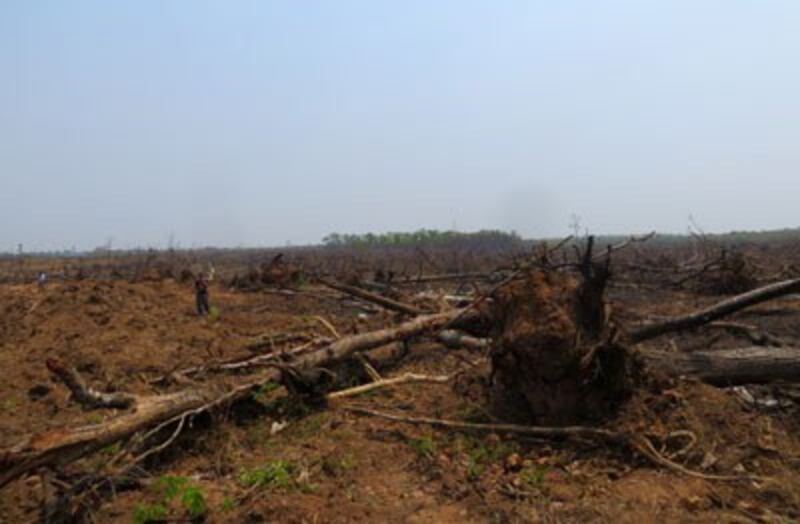Cambodian authorities have charged nearly half as many villagers in land dispute cases in the first three months of this year as they did in all of 2013, a local rights group said Thursday, adding that most of the rows stemmed from government-granted land concessions.
Following a “burst” of new land disputes, 48 people were charged for their alleged roles in land disputes in the first quarter of 2014 alone and 12 among them were detained, compared to 100 people charged and 20 detained last year, Adhoc said in a new report.
Speaking at a press conference in Phnom Penh, Adhoc director Thun Saray said that the majority of the disputes had arisen from land concessions and called on the government to take responsibility for resolving the crisis by ending the practice.
“The government’s policy on agriculture is a mistake,” he said of how Prime Minister Hun Sen’s administration had continued to allow concessions to operate despite an order he gave in May 2012 temporarily suspending those that have led to land grabs and illegal logging activities.
“We have seen that land concessions encroach on villagers’ land and crops where they used to live in harmony. The companies came and destroyed their property,” he said.
“We have sub-decrees on land concessions, but there is no implementation. This is a problem.”
Thun Saray said that in order to reduce land disputes in the future, the government must “completely end the practice of granting land concessions” and “confiscate any land from companies that don’t follow their agreements with the government.”
If the government continues to grant concessions, he said, companies should end the practice of evicting villagers and instead provide them with crops to grow that can be sold in foreign markets.
“This way, both the people and the companies will benefit, and the government can benefit through tax collection,” he said.
According to the Adhoc report, at least 770,000 people—about six percent of the population—have been negatively affected by encroachment on their land since 2000.
Those affected by the disputes often face the loss of their homes or the forests they subsist on, as well as poor relocation packages.
Some 2 million hectares (4.94 million acres) have been granted as land concessions in Cambodia, mostly in Preah Vihear, Siem Reap, and Ratanakiri provinces, the report said.
Council of Ministers spokesman Phay Siphan told RFA’s Khmer Service that the government had “reformed and reduced” land disputes cases, adding that Adhoc’s report “doesn’t reflect the [situation] throughout the country.”
He said there are three main types of land conflict in Cambodia—one between villagers and companies, another between villagers and companies granted land concessions, and a third involving villagers who encroach on public land.
“We are allowing all sides to participate in resolving the issues,” he said.
“Those [disputes which involve] complicated issues, we will investigate in greater detail.”

Lawsuit filed
Also on Tuesday, a group of around 400 members of the Kouy indigenous ethnic minority filed complaints through the Preah Vihear provincial court against Chinese companies Rui Feng and Lan Feng, accusing the two of perpetrating crimes against humanity in a forced eviction.
Adhoc provincial coordinator Lor Chan told RFA that the approximately 400 families from Preah Vihear’s Tbeng Meanchey district took the action because the two companies had forced them off of their land, “preventing them from farming, and they regard those actions as a crime against humanity.”
The villagers demanded that the companies compensate them for damages, which included “thousands of hectares of forest.”
Community representative Svay Poeun said he would like the court to investigate the allegations of deforestation.
“We would like the court to discuss with the companies how to resolve the problem of the villagers’ land being cleared,” he said.
Provincial prosecutor Ly Lon said he had received the complaint and pledged to investigate the case.
“We need to conduct a preliminary investigation to see if the companies have breached the law,” he said.
“If we have enough evidence, I will send the case to the investigating judge.”
RFA was unable to reach either of the two Chinese companies for comment.
But villagers said that the government’s policy of giving land concessions to private companies has led to the destruction of their culture.
They said that one of the companies had already cleared about half of 9,000 hectares (22,240 acres) which were previously occupied by residents.
Currently, five companies have been awarded 42,000 hectares (103,785 acres) of land in three districts in the area, they said.
Bitter problem
Land disputes are a bitter problem for Cambodia, where rural villagers and urban dwellers alike have been mired in conflicts that the U.N.’s special rapporteur for human rights to Cambodia has warned could threaten the country’s stability.
In addition to the suspension and review of land concessions, Hun Sen established a land titling program in late 2012 relying on more than 2,000 student volunteers to measure plots and distribute documentation, but critics have said the campaign lacks transparency and independent monitoring.
The World Bank halted funding to Cambodia in 2011 after state security forces helped to violently evict thousands of families from the Boeung Kak Lake community in Phnom Penh to make way for a real estate project in one of the country’s most-high profile cases.
The country’s land issues date from the 1975-79 Khmer Rouge regime, which forced large-scale evacuations and relocations, followed by a period of mass confusion over land rights and the formation of squatter communities when the refugees returned in the 1990s after a decade of civil war.
Reported by RFA’s Khmer Service. Translated by Samean Yun. Written in English by Joshua Lipes.
